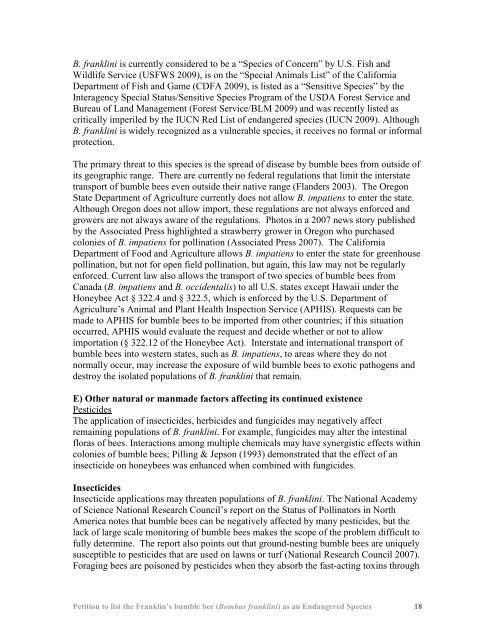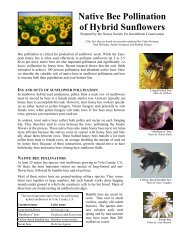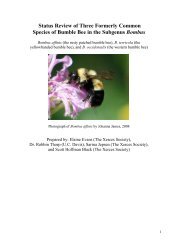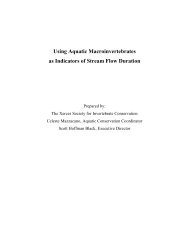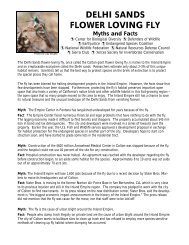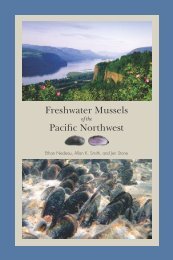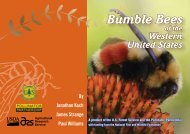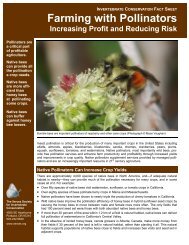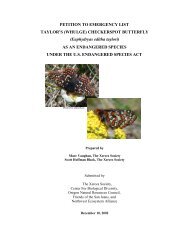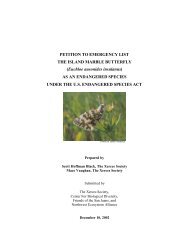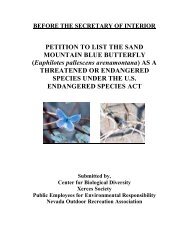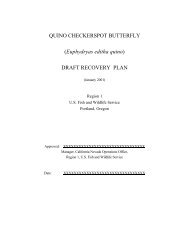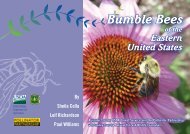Franklin's bumble bee - The Xerces Society
Franklin's bumble bee - The Xerces Society
Franklin's bumble bee - The Xerces Society
Create successful ePaper yourself
Turn your PDF publications into a flip-book with our unique Google optimized e-Paper software.
B. franklini is currently considered to be a “Species of Concern” by U.S. Fish and<br />
Wildlife Service (USFWS 2009), is on the “Special Animals List” of the California<br />
Department of Fish and Game (CDFA 2009), is listed as a “Sensitive Species” by the<br />
Interagency Special Status/Sensitive Species Program of the USDA Forest Service and<br />
Bureau of Land Management (Forest Service/BLM 2009) and was recently listed as<br />
critically imperiled by the IUCN Red List of endangered species (IUCN 2009). Although<br />
B. franklini is widely recognized as a vulnerable species, it receives no formal or informal<br />
protection.<br />
<strong>The</strong> primary threat to this species is the spread of disease by <strong>bumble</strong> <strong>bee</strong>s from outside of<br />
its geographic range. <strong>The</strong>re are currently no federal regulations that limit the interstate<br />
transport of <strong>bumble</strong> <strong>bee</strong>s even outside their native range (Flanders 2003). <strong>The</strong> Oregon<br />
State Department of Agriculture currently does not allow B. impatiens to enter the state.<br />
Although Oregon does not allow import, these regulations are not always enforced and<br />
growers are not always aware of the regulations. Photos in a 2007 news story published<br />
by the Associated Press highlighted a strawberry grower in Oregon who purchased<br />
colonies of B. impatiens for pollination (Associated Press 2007). <strong>The</strong> California<br />
Department of Food and Agriculture allows B. impatiens to enter the state for greenhouse<br />
pollination, but not for open field pollination, but again, this law may not be regularly<br />
enforced. Current law also allows the transport of two species of <strong>bumble</strong> <strong>bee</strong>s from<br />
Canada (B. impatiens and B. occidentalis) to all U.S. states except Hawaii under the<br />
Honey<strong>bee</strong> Act § 322.4 and § 322.5, which is enforced by the U.S. Department of<br />
Agriculture’s Animal and Plant Health Inspection Service (APHIS). Requests can be<br />
made to APHIS for <strong>bumble</strong> <strong>bee</strong>s to be imported from other countries; if this situation<br />
occurred, APHIS would evaluate the request and decide whether or not to allow<br />
importation (§ 322.12 of the Honey<strong>bee</strong> Act). Interstate and international transport of<br />
<strong>bumble</strong> <strong>bee</strong>s into western states, such as B. impatiens, to areas where they do not<br />
normally occur, may increase the exposure of wild <strong>bumble</strong> <strong>bee</strong>s to exotic pathogens and<br />
destroy the isolated populations of B. franklini that remain.<br />
E) Other natural or manmade factors affecting its continued existence<br />
Pesticides<br />
<strong>The</strong> application of insecticides, herbicides and fungicides may negatively affect<br />
remaining populations of B. franklini. For example, fungicides may alter the intestinal<br />
floras of <strong>bee</strong>s. Interactions among multiple chemicals may have synergistic effects within<br />
colonies of <strong>bumble</strong> <strong>bee</strong>s; Pilling & Jepson (1993) demonstrated that the effect of an<br />
insecticide on honey<strong>bee</strong>s was enhanced when combined with fungicides.<br />
Insecticides<br />
Insecticide applications may threaten populations of B. franklini. <strong>The</strong> National Academy<br />
of Science National Research Council’s report on the Status of Pollinators in North<br />
America notes that <strong>bumble</strong> <strong>bee</strong>s can be negatively affected by many pesticides, but the<br />
lack of large scale monitoring of <strong>bumble</strong> <strong>bee</strong>s makes the scope of the problem difficult to<br />
fully determine. <strong>The</strong> report also points out that ground-nesting <strong>bumble</strong> <strong>bee</strong>s are uniquely<br />
susceptible to pesticides that are used on lawns or turf (National Research Council 2007).<br />
Foraging <strong>bee</strong>s are poisoned by pesticides when they absorb the fast-acting toxins through<br />
Petition to list the Franklin’s <strong>bumble</strong> <strong>bee</strong> (Bombus franklini) as an Endangered Species 18


